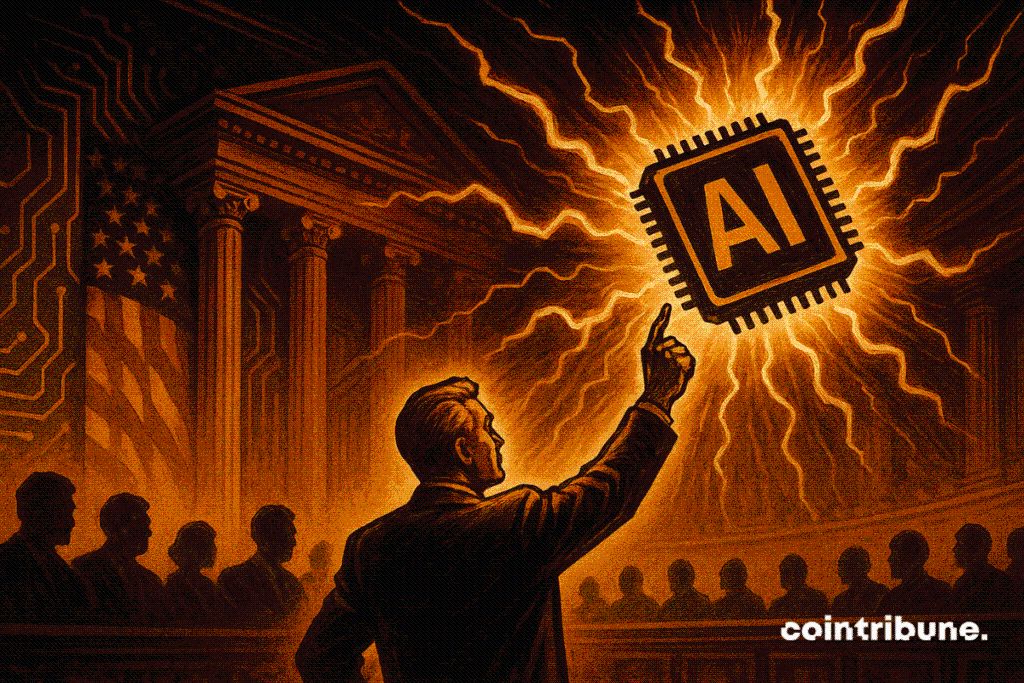GAIN Act: The US Senate Passes a Law That Could Disrupt the AI Chip Industry
The United States seems determined to dominate everything: not only the markets but also the processor cores, the AI race, and the global digital infrastructure. The GAIN Act requires AI chip manufacturers to serve American customers first before any export. Is this a security maneuver or an imperial ambition? Should everything be seized and controlled starting today? This text could redraw the global technological balance, at what cost for the rest of the world and for cryptomining?

In Brief
- The GAIN Act reserves AI chips for US companies before any foreign export.
- The Senate validates this strategic law by 77 votes to 20 despite industrial reluctance.
- Nvidia and others denounce a market closure to the detriment of global innovation.
- Crypto miners find themselves trapped, facing cost increases and logistical delays.
GAIN Act: A Technological Patriot Act
The GAIN Act inserted into the NDAA 2026 establishes a strong rule: before exporting artificial intelligence or HPC chips, manufacturers must fulfill orders from the US market. Congress reserves the right to ban export licenses on the most advanced circuits. This national priority logic echoes the trajectory of the Patriot Act: enhanced control, limitation of foreign use.
The Senate approved the text with 77 votes in favor, 20 against. According to Americans for Responsible Innovation: “In the Senate, placing the United States first is considered a badge of honor“.
Their chairman Brad Carson states :
As we work to maintain the United States’ lead in AI development, we need advanced AI chip manufacturers to sell to American companies first before addressing countries considered concerning. The GAIN AI Act constitutes a major victory for the United States’ economic competitiveness and national security.
This alliance between technological sovereignty and militarization of export control marks a leap: AI becomes a regulated border, not an open resource for global trade.
AI & USA: “America First” or Technological Isolation?
Adopting an AI version of “America First” means fencing innovations off: only American actors benefit first. The GAIN Act forces chip sales first to American customers, even if foreign partners need them. This approach is part of a broader policy.
The White House, via one of its advisors, David Sacks, attempted to remove this provision from the text, arguing that it would slow down technology export expansion.
In their letter to the Senate, ARI and American Compass remind that AI has a dual dimension between civil technology and national security: prioritizing the domestic market would prevent competitors from surpassing the United States.
The risk? That non-American AI startups are disqualified from the international game. By trying to lock the domestic AI chain, the USA could isolate their market. The global AI ecosystem risks fragmenting. The challenge: reconcile sovereignty and openness — without stifling innovation.
Cryptominage in the Trap: Signals to Watch
The GAIN Act does not explicitly mention crypto mining. However, it affects a key use of GPUs and high-performance chips that miners use to secure blockchains. CleanSpark has already been ordered to pay 185 million USD for contested imported equipment; IREN faces a claim of 100 million USD.
These figures illustrate the fragility of the system. These disputes show that the commercial framework of crypto equipment is already under strain.
Here are 5 signals to watch:
- October 9, 2025: adoption of the GAIN Act in the Senate (77 for / 20 against);
- Manufacturers like Nvidia must reserve chips for US customers before export;
- CleanSpark: $185M claimed by customs;
- IREN: $100M in potential debts;
- Possible migration of operations to freer jurisdictions.
These elements point to a risk of hardware congestion for mining. Fewer chips available = cost increases = lower profitability.
Moreover, a drop in the US hashrate could weaken the United States’ position in the global cryptosphere infrastructure. The text thus threatens not only AI giants but also decentralized web actors.
When Donald Trump unveiled his strategy for AI , he did not mince words: he wants the United States to dominate technology without compromise. The GAIN Act fits into this trajectory, creating a framework supposed to protect American AI. But in this quest for control, crypto miners, AI startups, and global innovation also risk paying the price.
Disclaimer: The content of this article solely reflects the author's opinion and does not represent the platform in any capacity. This article is not intended to serve as a reference for making investment decisions.
You may also like
Quantum Computers Unlikely to Threaten Bitcoin in the Near Term, Experts Say
Ethereum Price Jumps 10% on Reversal Cues — But History Warns Of A Ceiling
3 Altcoins That Could Face Major Liquidation Risks During Christmas Week
Galaxy Digital Issues 2027 Bitcoin Forecast as 2026 Outlook Remains Unclear
